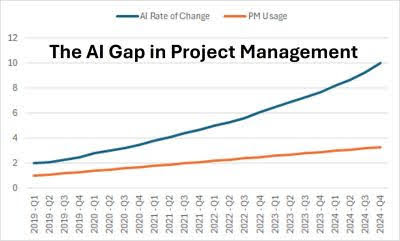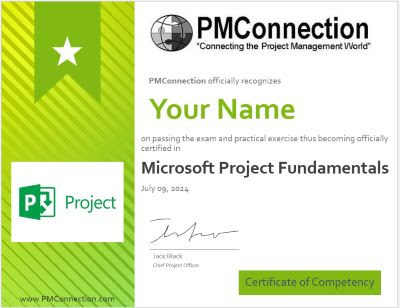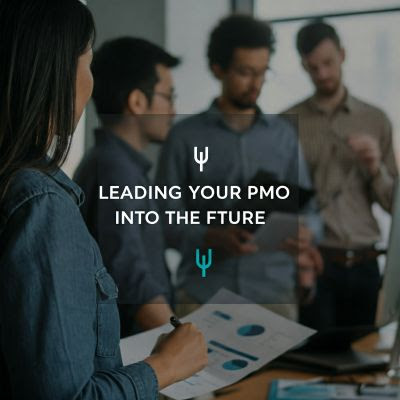|
There isn't content right now for this block.
|
|
The AI Revolution in Project Management: Elevating Productivity with Generative AI
Citizen Development: The Handbook for Creators and Change Makers
A Guide to the Project Management Body of Knowledge: PMBOK 7th Edition 2021
PMP Project Management Professional Exam Study Guide ![]()
Microsoft Project Step by Step
![]()
Microsoft Project
Managing Enterprise Projects: Using Project Online and Microsoft Project Server
|
|  |
|
Program and PMO: AI Agents Will Soon Run Your Project Management Office (PMO)
|
|


AI Agents Will Soon Run Your Project Management Office (PMO)Watch video HERE The advent of AI agents is revolutionizing the way businesses operate, and one of the most promising applications is in the realm of project management. AI agents are poised to take over the Project Management Office (PMO), bringing unprecedented efficiency, accuracy, and scalability to project management processes. 1. Enhanced Efficiency and ProductivityAI agents can automate routine tasks such as scheduling, resource allocation, and progress tracking. By embedding human workflows into software, these agents free up project managers to focus on strategic decision-making and problem-solving. This automation leads to significant time savings and allows for more projects to be managed simultaneously.
2. Improved Decision-MakingAI agents can analyze vast amounts of data in real-time, providing project managers with actionable insights. They can predict potential risks, identify bottlenecks, and suggest optimal solutions. This data-driven approach enhances the quality of decisions, leading to better project outcomes.
3. Seamless CollaborationMultiple AI agents can work together on complementary tasks, ensuring seamless collaboration across different project teams. They can communicate and coordinate with each other, ensuring that all aspects of a project are aligned and progressing smoothly. This level of coordination is difficult to achieve with human teams alone.
4. ScalabilityAI agents enable the scaling of project management operations without a proportional increase in human resources. They can handle an increasing number of projects and tasks without compromising on quality or efficiency. This scalability is particularly beneficial for growing businesses looking to expand their operations.
5. Cost SavingsBy automating routine tasks and improving efficiency, AI agents can significantly reduce the costs associated with project management. Businesses can achieve more with fewer resources, leading to substantial cost savings in the long run.
6. Future ProspectsThe integration of AI agents into PMOs is just the beginning. As AI technology continues to evolve, we can expect even more sophisticated capabilities, such as advanced predictive analytics, natural language processing, and autonomous decision-making. These advancements will further enhance the role of AI in project management, making it an indispensable tool for businesses worldwide. In conclusion, AI agents are set to transform the Project Management Office by enhancing efficiency, improving decision-making, enabling seamless collaboration, providing scalability, and reducing costs. As businesses continue to embrace AI, the future of project management looks brighter than ever.
Concept Sources: - AI agents could birth the first one-person unicorn — but at what societal cost? - Chatbots are everywhere and will proliferate - Copilot Agents Unleashed: Agent Builder, Copilot Studio & SharePoint Agents
Other: - Join the AI in Project Management LinkedIn Group from HERE - Sign up for the AI in Project Management Newsletter from HERE - See other articles, videos and podcasts on AI in Project Management from HERE
Note: You may find this Training Course helpful:
|

Note: You may find this training course of value:
|


(Notional data - NOT fact based)
Listen to Deep-Dive Podcast from HERE
Bridging the AI Gap in Project Management: Why It Matters
and What to Do
In recent years, artificial intelligence (AI) has
moved from futuristic buzzword to tangible game-changer—reshaping industries,
customer experiences, and even how organizations structure their day-to-day
operations. Yet, amid all this rapid innovation, there’s a growing reality: Project
Managers are often left behind in adopting and understanding these
transformative tools.
A notional look at AI’s rapid ascent compared to
project managers’ slower adoption highlights the crux of the issue. While AI
grows at an exponential pace - like a tech rocket fueled by Moore’s Law - Project
Managers may only be tiptoeing into the basics of AI. Although the exact
numbers behind this gap can vary by company or industry, the concept
remains consistent: the wider this divide, the more potential value gets lost.
The Widening Divide: It’s About More Than Just Tools
It’s tempting to blame a lack of technical training
or insufficient budgets. But the gap also reflects organizational culture,
change management challenges, and mindset:
- Exponential
Growth vs. Linear Adoption
AI tools and platforms evolve at a staggering rate, releasing new features
and breakthroughs much faster than most teams can adapt or even
understand. - Fear
of the Unknown
For many Project Managers, AI can feel like an entirely separate
domain—one requiring advanced data science skills. This often results in hesitation
to explore or champion AI-driven solutions. - Competing
Priorities
PMs already juggle deadlines, resources, risk assessments, and stakeholder
communications. Without clear incentives or a culture of innovation,
adopting AI can slip down the priority list.
Why This Matters: Lost Opportunities & Competitive
Edge
Each quarter that passes without seriously embedding AI
into project management practices is a missed opportunity. From streamlined
scheduling to predictive analytics that spot issues before they
escalate, AI can:
- Automate
time-consuming tasks (resource allocation, repetitive updates, etc.).
- Provide
predictive insights for better risk management.
- Foster
data-driven decision-making that aligns daily operations with
strategic goals.
Organizations that embrace AI in project management not only
speed up time-to-market for new initiatives but also deliver projects
with fewer surprises and more targeted resource usage. In a marketplace
that prizes agility and innovation, any ongoing delay in catching up with AI
can put a company behind its competitors.
The Call to Action: Elevate Your PM Skills
For Project Managers who sense this gap—and for
organizations aiming to thrive—there’s a clear next step:
- Invest
in AI-Focused Training: Seek out “AI in Project Management” courses,
workshops, and certifications. These programs demystify AI tools, offering
PMs hands-on experience and practical strategies. We suggest this course; "AI Essentials for Project Managers".
- Champion
a Culture of Experimentation: Encourage project teams to pilot AI
solutions in small projects, share learnings openly, and celebrate both
successes and “teachable” failures.
- Collaborate
with AI Specialists: Partner PMs with other thought leaders
to integrate new capabilities seamlessly and drive faster adoption. We suggest this LinkedIn Group; "AI in Project Management".
Bridging the AI gap isn’t just a technological challenge - it’s
about empowering people to harness breakthroughs that are already
reshaping the business landscape. Whether or not you have precise data points
or charts to reference, the message is the same: Act now to ensure your
project teams are poised to leverage AI’s full potential - and avoid
getting left behind in the race for innovation.
Note: You may find this training course of value:
|
|
Project Management: What is the number one thing that I should learn to advance my PM Career?
|
|

We queried all of the following Generative AI tools with the exact same prompt:
"Think like a senior project management coach. Moving into 2025, what is the number one thing that I should learn to advance my career as a project manager?"
Here are the results:
- PMI Infinity - Adaptability and Continuous Learning
- Microsoft Copilot - Agile and Hybrid methodologies
- ChatGPT - AI
- Gemini - Leadership and influencing skills
- Grok - AI literacy and integration
- Meta AI - Adaptive Leadership and Strategic Agility
Now, you be the "human in the loop" to decide which is the best response for you!
Note: You may find this Training Course helpful:
|
|
PMP: Taking the PMP Exam: Testing Center vs. Online
|
|

Taking the PMP Exam: Testing Center vs. Online TLDR: Go to a Testing Center! When it comes to taking the Project Management Professional (PMP) exam, candidates have the option to choose between a traditional testing center or an online proctored exam. Each option has its own set of advantages and disadvantages, and the best choice depends on individual preferences and circumstances. Below, we explore the pros and cons of both options to help you make an informed decision. Pros and Cons Table
|
| Testing Center | Pros
- Controlled Environment: Quiet and free from distractions | Cons
- Travel Requirements: Inconvenient and time-consuming |
| - Technical Support: Immediate assistance available | - Fixed Schedule: Limited flexibility |
| - Standardized Setup: Uniform testing conditions | - Potential Anxiety: Formal setting may increase stress |
| - Reduced Risk of Technical Issues: Professional equipment and stable internet |
| | Online Proctored Exam | - Convenience: Take the exam from home or office | - Technical Requirements: Must meet specific computer and internet standards |
| - Flexibility: More scheduling options | - Distractions: Home environment may have interruptions |
| - Comfortable Environment: Familiar setting can reduce anxiety | - Proctoring Challenges: Strict monitoring can feel intrusive |
SummaryIn summary, both testing center and online proctored exams have their own unique advantages and disadvantages. Testing centers offer a controlled environment with immediate technical support, but require travel and have fixed schedules. Online exams provide convenience and flexibility, but come with technical requirements and potential distractions. Ultimately, the choice between the two options depends on your personal preferences, comfort level, and logistical considerations. From my persponal perspective, I have heard from three people within the last year that did NOT go to a testing center and for various reasons got disqualified and had to retake ths exam. Remove this risk. Got to a Testing Center!
Additional Resources
- PMP Prep Tips
- PMP Prep Questions
- PMP Exam Day Tips
Note: You may find this product of value:
|
Posted by webadmin on Thursday, December 26 @ 13:06:35 EST (179 reads)
(Read More... | 5376 bytes more | PMP | Score: 0)
|
|

About This Course
This course focuses on leveraging the latest, modern technology to improve processes and decision making related to Project Management. It is geared to provide two things:
A Path - This course will guide you through various topics starting simple and adding complexity with each new topic.
A Pragmatic Approach - This course is built to show you "How to work with AI", not "How AI works". These phrases are very similar, but as a project professional you will gain more value in actually learning how to leverage the technology.
More Details- 8 Modules
- 34 Lessons (Expand Course Curriculum below)
- 6 Hands-On Assignments
- 6 Quizzes
- Step-by-Step with Screenshots
- Many SHORT videos
- Self-Paced
- Approximately 6 hours
- Course Completion Certificate
Course Curriculum- Module 1: Introduction to AI
- Module 2: AI Technologies and Applications
- Module 3: Practical AI Implementation
- Module 4: Generative AI and Prompt Engineering
- Module 5: Intelligent Automation
- Module 6: Custom Chatbots
- Module 7: Data Visualization
- Module 8: Wrap-Up
Find more details and register for this course from HERE
Note: You may find this trainig course of value:
|

About This Course
The PMI Infinity 2.0 Training course is designed to provide project management professionals with a comprehensive understanding of PMI Infinity, an advanced Generative AI solution tailored for the project management profession.
Participants will engage with various learning materials, including short videos, quizzes, a Capstone Assignment, and a Final Exam. The "Watch and Do" format encourages active learning, requiring participants to use two monitors—one to watch instructional videos and the other to replicate the demonstrated steps, ensuring practical experience.
This online, self-paced course is Led by a seasoned PMI authorized PMP trainer, the course offers valuable insights into PMI Infinity's features, including the Guided Experience and Prompt Library.
By the end of the training, participants will be well-equipped to enhance their project management practices using this powerful AI tool.
Course Details- 4 Modules
- Over 20 Lessons (Expand Course Curriculum below)
- Many short high-quality "How To" videos
- Module Quizes and Final Exam to reinforce learning
- Approximately 3 hours
- Course Completion Certificate
Course Curriculum- Module 1 - Introduction
- Module 2 - Demonstration
- Module 3 - Use Cases
- Module 4 - Wrap Up
Find more details about this course from HERE
Note: You may find this Training Course helpful:
|

About this Course
This course will teach you the best practices for developing and managing a schedule using Microsoft Project (the Desktop Client).
Created by a Microsoft Certified MS Project User who is a college instructor and has used this application on a regular basis since 1995.
More Details- 8 Modules (Expand Course Curriculum below)
- Step-by-Step Videos (Over 3 hours)
- User Guide (0ver 700 pages)
- Module Quizes to reinforce learning
- Hands-on Capstone Assignment
- Final Exam
- Approximately 8 hours
- Course Completion Certificate
Course Curriculum- Introduction
- Module 1: Overview
- Module 2: Getting Started
- Module 3: Project Setup
- Module 4: Schedule Development
- Module 5: Schedule Management
- Module 6: Reporting
- Module 7: Other Tips
- Module 8: Getting Assistance
- Capstone Assignment and Final Exam
Sign up for this course from HERE
Note: You may find this certification of value:
|
|
MS Project: Microsoft Project Fundamentals Certification
|
|

About This Course Acquiring this Microsoft Project certification has two requirements: 1. Complete a Microsoft Project Certification Exam 2. Complete a Microsoft Project Certification Exercise
NOTE A: This is for Microsoft Project (the Desktop Client) NOTE
B: This is NOT simply a Course Completion Certificate. Just like the
PMP Exam, you will earn this certification based upon your knowledge and
skillset.
NOTE C: There is no training
material provided as part of this certification course. The assumption
is that you already know the best practices of developing a schedule in
Microsoft Project. You will find an online, self-paced Microsoft Project training course from HERE.
1. Complete a Microsoft Project Certification Exam:- 25 Questions - Multiple Choice, True or False - 45 Minutes - You must score at least 88%

2. Complete a Microsoft Project Certification Exercise:- Use the information provided within an Exercise file - Once complete, upload your schedule (.mpp file) - Your schedule will be assessed using the 31 Point Microsoft Project Quality Checklist - You will be provided the results of your assessment after submitting - You must score at least 80% - You will get two attempts to pass. If you fail the second attempt, you must start the entire course over again

The CertificationUpon completing the Certification Exam and this Certification Exercise with passing scores, you will receive a Microsoft Project Certification to share on via Social Media.
Earn your Microsoft Project Fundamentals Certification from HERE
Note: You may find this training course of value:
|


Leading Your PMO into the Future
Listen to the Deep Dive Podcast HERE
The role of the Project Management Office (PMO) is evolving
rapidly as organizations face the dual challenges of increasing complexity and
technological advancement. To remain relevant and effective, PMOs must embrace
future-ready characteristics and undergo transformative changes. This article
explores key characteristics of the PMO of the future and offers guidance on
steps to achieve this transformation.
Characteristics of a PMO of the Future
- Technology-Driven
Operations: The future PMO will integrate advanced technologies such
as Artificial Intelligence (AI), Machine Learning (ML), and Robotic
Process Automation (RPA) to automate routine tasks, enhance
decision-making, and optimize project outcomes. AI-driven tools like predictive
analytics, risk identification, and automated reporting will be pivotal in
improving efficiency.
- Data-Centric
Decision-Making: Data will become the backbone of PMO operations. By
utilizing real-time and historical data, PMOs can forecast project trends,
optimize resource allocation, and provide actionable insights to
stakeholders. These capabilities enable proactive management rather than
reactive fixes.
- Agility
and Flexibility: Agile methodologies will become essential for PMOs,
enabling quick responses to changes in project scope, market demands, or
organizational strategies. Flexibility ensures that the PMO can adapt to
both traditional and innovative project management frameworks.
- Strategic
Alignment: Future PMOs will prioritize projects that align closely
with organizational goals. This requires robust portfolio management to
ensure resources are allocated effectively and projects deliver maximum
value.
- Enhanced
Collaboration: Collaborative platforms and AI-driven communication
tools will ensure transparency and reduce silos among project teams,
stakeholders, and leadership. This will foster better alignment and
accountability.
- Continuous
Learning and Improvement: A forward-looking PMO will embed continuous
improvement into its culture by using lessons learned and leveraging AI to
detect performance gaps and suggest enhancements. This ensures sustained
growth and adaptability.
Steps to Transform Your PMO
- Assess
the Current State: Conduct a comprehensive assessment of your PMO’s
current capabilities, including its strategy, processes, tools, and data
maturity. This step identifies gaps and opportunities for targeted
improvements.
- Define
the Future Vision: Establish a clear, strategic vision for the future
state of your PMO. Incorporate goals like technological integration,
improved governance, and enhanced strategic alignment into this vision.
- Develop
a Transformation Roadmap: Create a phased plan outlining steps to
achieve the future state, including key milestones, resource allocation,
and technology investments. Use this roadmap to maintain focus and track
progress.
- Adopt
Advanced Technologies: Integrate tools that leverage AI and data
analytics for real-time tracking, predictive insights, and process
automation. These technologies will reduce manual effort and improve
decision accuracy.
- Enhance
Workforce Skills: Provide training programs focused on AI literacy,
agile methodologies, and data analytics. Empower your team to embrace and
maximize the potential of new technologies. The online, self-paced training couse called "AI Essentials for Project Managers" is a great source for PMO Leaders, Project Managers, and others!
- Promote
Strategic Collaboration: Foster a collaborative environment across all
levels of the organization. Use digital tools to enhance stakeholder
communication, align objectives, and ensure seamless project execution.
- Monitor
Progress and Adapt: Use key performance indicators (KPIs) and
real-time dashboards to track the PMO’s progress. Regularly review
outcomes and adapt strategies to address emerging challenges and
opportunities.
Conclusion
The journey to a future-ready PMO requires a strategic
embrace of advanced technologies, data-driven decision-making, and continuous
improvement. By focusing on agility, collaboration, and strategic alignment,
organizations can position their PMO as a cornerstone of innovation and
operational excellence. The time to transform is now.
Note: You may find this Training Course helpful:
|
|  |
"Your guided path to acquire the Six Sigma Greenbelt"
"65 Questions and Suggested Answers"
|
|
AI in Project Management Newsletter
|
|
Use Google technology to search the entire PMConnection website here.
Use Microsoft technology to chat with PMConnection Copilot here. |
We received
80082638
page views since January 2006
|
|
Free Project Management and Microsoft Project Schedule Templates here!
|
|
The Project Management Mall - Now Open!
|
|
|
Latest Exclusive Articles
|
|
|

